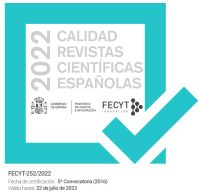La eudaimonía aristotélica como fin de las acciones
DOI:
https://doi.org/10.5944/endoxa.52.2023.28870Palabras clave:
Fin, Felicidad, Contemplación, Bien, Ética.Resumen
Se estudia que tipo de fin (τέλος) es la felicidad (εὐδαιμονία) para Aristóteles, pues en las obras Éticas unas veces se identifica con varios fines y otras con uno solo, es el antiguo debate entre los defensores del fin inclusivo y del fin dominante. Para Aristóteles el fin responde a la naturaleza o la función para la cual está hecha cada cosa, si la función del hombre es una vida según la razón, el fin de la felicidad deberá ser la contemplación. Por este motivo, solamente el hombre y los seres superiores pueden ser llamados felices, porque son los únicos que gozan de esta facultad.Descargas
Citas
ACKRILL, J. L. (1997). Essays on Plato and Aristotle. New York: Oxford University Press.
ANNAS, J. (1993). The Morality of happiness. New York: Oxford University Press.
ARISTÓTELES. (1994). Metafísica (Int, Tr y Not Tomás Calvo Martínez). Madrid: Gredos.
— (1998). Ética Nicomaquea. Ética Eudemia (Int. Emilio Lledó Iñigo, Tr y Not Julio Pallí Bonet). Madrid: Gredos.
ASPASIUS. (2006). Aspasius. On Aristotle Nicomachean Ethics 1-4, 7-8. (Tr. David Konstan). London: Bloomsbury.
ASSELIN, D. (1989). Human nature and Eudaimonia in Aristotle. New York: Peter Lang.
BERTI, E. (2012). El pensamiento político de Aristóteles (Tr. Helena Aguilá). Madrid: Gredos.
BRENTANO, F. (1943). Aristóteles (Tr. Moisés Sánchez Barrado). Barcelona: Editorial Labor.
BROADIE, S. (1991). Ethics with Aristotle. New York: Oxford University Press.
BURNET, J. (1900). The ethics of Aristotle. Londres: Methuen and Co.
BUSH, S. S. (2008). “Divine and Human Happiness in Nicomachean Ethics”. The Philosophical Review. Vol. 117. N. 1. p. 52.
CANTÚ QUINTANILLA, F. (2004). Contemplar para amar. Felicidad, sabiduría y contemplación en el pensamiento ético de Aristóteles. México: Fondo de Cultura Económica.
CHARLES, D. (1999). “Aristotle on Well-Being and Intellectual Contemplation”. Aristotelian Society. Vol. 73. pp. 205-223.
CLARK, S. R. L. (1975). Aristotle's Man: Speculations upon Aristotelian Anthropology. Oxford: Clarendon Press.
GARCÍA SANTOS, C. (2001). “Quod tέλος Graecidicunt. El concepto latino finís respecto del griego tέλος ante la problemática de la gradación del supremo bien planteada en el De Finibus de Cicerón”. Anuario Filosófico. Vol. 34. p. 798.
GRANT, A (1866). Aristotle's ethics. Vol. I-II. London: Longmans. Green. and. Co.
FOWERS, B. J. (2016). “Aristotle on Eudaimonia: On the virtue of returning to the source”. In Vittersø, J (Ed), The handbook of eudaimonia well-being. New York: Springer. pp. 67-83.
FRISK, H. (1960). Griechisches Etymologisches Worterbuch. Heidelberg: Carl Winter. Universitatsverlag.
GUARIGLIA, O. (1997). La Ética en Aristóteles o la moral de la virtud. Buenos Aires: Eudeba S.E.M.
HARDIE, W. F. R. (1965). “The Final Good in Aristotle's Ethics”. Philosophy. Vol. 40. N. 154. pp. 277-295.
— (1968). Aristotle's Ethical Theory. Oxford: Clarendon Press.
HEINAMAN, R. (1988). “Eudaimonia and Self-Sufficiency in the Nicomachean Ethics”. Phrónesis. Vol. 33. N. 1. pp. 31-53.
JAEGER, W. (1946). Aristóteles. Base para la historia del desarrollo intelectual. (Tr. José Gaos). México: Fondo de Cultura Económica.
JOACHIM, H. H. (1985). Aristotle. The Nicomachean Ethics. Westport, Connecticut: Greenwood Press, Publishers.
KENNY, A. (1992). Aristotle on the Perfect Life. Oxford: Clarendon Press.
— (2001). Essays on the Aristotelian Tradition. Oxford: Clarendon Press.
KRAUT, R. (1989). Aristotle on the Human Good. Princeton University Press.
LEONARD, J. (1948). Le bonheur chez Aristote. Brussels: Académie Róyale de Bélgique.
LLEDÓ, E. (1993). Aristóteles. Ética Nicomáquea, Ética Eudemia. Madrid: Gredos.
LLOYD, G. E. R. (1968). Aristotle: The growth and structure of his thought. United Kingdom: Cambridge University Press.
REALE, G. (1985). Introducción a Aristóteles. Barcelona: Herder.
ROSS, D. (1995). Aristotle. (Int. John L. Ackrill). London and New York: Routledge.
SIMÓN ABRIL, P. (2001). La Ética de Aristóteles. Albacete: Libros en la red.
STEWART, J. A. (1982). Notes on the Nicomachean Ethics of Aristotle. Vol. II. Oxford: At the Clarendon Press.
TUGENDHAT, E. (1988). Problemas de la Ética (Tr. Jorge Vigil). Barcelona: Editorial Crítica: Grupo Editorial Grijalbo.
VIGO, A. G. (1997). La concepción aristotélica de la felicidad. Santiago de Chile: Universidad de los Andes.
— (2012). “Deliberación y decisión según Aristóteles”. Tópicos. Vol. 43. pp. 57-92.
WANDERS, F. M. J (1983). The history of τέλος and τελέω in Ancient Greek, B. R. Amsterdam: Grüner Publishing co.
Descargas
Publicado
Cómo citar
Número
Sección
Licencia

Esta obra está bajo una licencia internacional Creative Commons Atribución-NoComercial-SinDerivadas 4.0.








